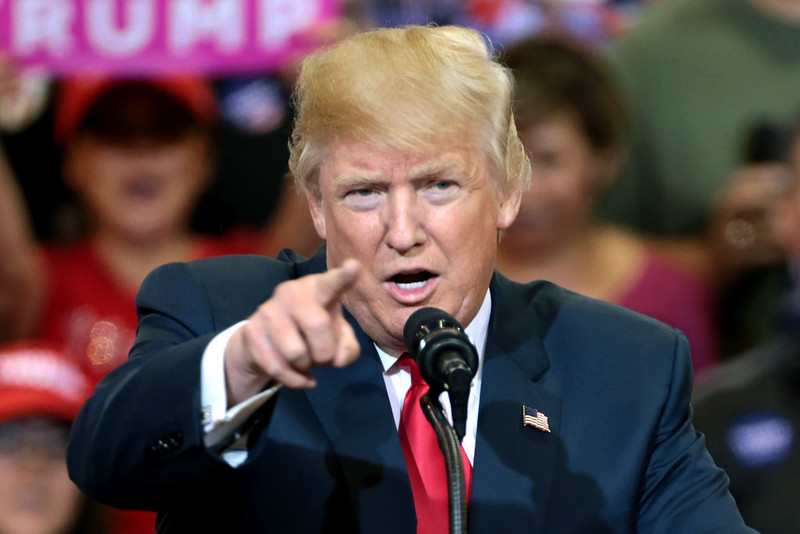
Donald Trump (2016). Image by Gage Skidmore via Flickr.com. License: CC BY-SA 2.0
In the gerontocratic election campaign for the most powerful office in the world, crypto is becoming increasingly important. Donald Trump knows how to use this to his advantage – and according to a prediction market, he clearly has the better chances.
So now he has done it: Former and possibly future US President Donald Trump has called himself a “crypto president.”
You need a superhuman amount of imagination, but please, try and imagine: Olaf Scholz – or, to make it less absurd, at least a little bit – Friedrich Merz would call himself a “crypto chancellor”. Or Ursula von der Layen a crypto commissioner.
Germany and the USA are not just separated by an Atlantic Ocean. Here, crypto plays no role in either federal or state elections, and no candidate in the European elections even mentioned it a single syllable. In the USA, on the other hand, crypto has made it into the agenda of the election campaign for the presidential election on November 5, 2024.
It would be a bit of an exaggeration to say that control over the world’s most powerful army may be decided by its stance on Bitcoin and crypto.

The Golden Gate Bridge in San Francisco. Image by verygreen via flickr.com. License: CC BY-2.0
It goes without saying that we as a Bitcoin blog find this fascinating; however, this is not a reason to glorify the USA or Donald Trump. The circumstances alone under which Trump called himself a “crypto president” are questionable in a way that is hardly conceivable in the EU: Trump raised twelve million dollars in campaign money from tech venture capitalists, for which he attended an event held at David Sacks’ house in San Francisco’s chic Pacific Heights district, with a beautiful view of the Golden Gate Bridge.
David Sacks, former PayPal COO and host of the “All In” podcast, is, if you follow his Twitter account, more or less THE voice of the Kremlin in the USA. Since Russia invaded Ukraine, he has been spreading the Russian narrative almost non-stop and without a critical streak; he vehemently rails against any help for Ukraine to defend itself against the invasion.
At that rendezvous with tech billionaires, Trump said he was “very supportive” of crypto, according to one Republican. Another attendee, Jacob Helberg, a consultant and analyst at Palantir – a thoroughly controversial software company – reported that Trump promised he would “stop the Biden crusade against crypto within an hour of starting his second term.”
In fact, Trump and the Republicans are likely to adopt more crypto-friendly policies, while SEC Chairman Gary Gensler, appointed by incumbent Joe Biden, enjoys more of a reputation in the crypto scene as someone who, if allowed, would stamp 9 out of 10 coins into the ground.
But to be fair, it must also be admitted that under Gary Gensler and Joe Biden, Bitcoin ETFs were approved, the USA was able to maintain its position as the world’s most important location for crypto and expand its dominance in mining. If the Democratic government did not make this happen, it certainly did not prevent it.
Also, during his last term in office, which was not that long ago, Trump had more than enough opportunities to act crypto-friendly, or at least say a nice word. The fact that he missed this, that he saved all his love of crypto for the election campaign, shows … that maybe he only cares about the election campaign after all.
Nonetheless, a relatively large part of the crypto industry seems to be much more behind Trump than behind Biden. This starts with the fact that Trump is accepting crypto donations in his election campaign, while Biden’s team does not even want to comment on it. It continues with the fact that the lobby group “Stand with Crypto”, which was also co-founded by Coinbase CEO Brian Armstrong, does not explicitly support Trump, but speaks vehemently against Biden’s policies – and thus explicitly addresses swing states.
Brian Armstrong may be sincere when he says the group is neutral and is beating the drum for cryptocurrencies in both political camps. But their actions are likely to pay off with Trump, if only because he is judged by his promises, while Biden is judged by his policies.

This mood is reflected on prediction markets such as Polymarket, where 165 million dollars have now been bet on the outcome of the election on November 5. Donald Trump is given a chance of 56 percent, while Joe Biden only 34 percent. The remaining 10 percent will almost entirely go to other Democratic candidates, such as Kamela Harris, Michelle Obama or Gavin Newsom. This probably expresses the morbid expectation that Joe Biden will experience the next legislative period neither in the White House nor in the Senate, but from a retirement home or a wooden apartment.
Future historians will probably look at our times with a certain amount of irritation. President Biden, who will be 82 on election day, is trying to defend his office against 78-year-old Donald Trump, while in the EU Ursula von der Leyen, who is almost a youth at 65, is starting another term as Commission President, and in Germany next year 67-year-old Olaf Scholz will most likely lose to 70-year-old Friedrich Merz.
At the same time, a 72-year-old Vladimir Putin is waging war on Ukraine from Russia, with the support of 70-year-old Xi Jinping, while in Israel a 74-year-old Bibi Netanyahu is trying to stop the terror from the Gaza Strip, but is probably only igniting more terror.
Future historians will probably describe our political reality as a gerontocracy: a time in which men of an age when one would normally talk about nursing homes, stair lifts and giving up driving licenses are leading the most powerful states in the world, and are often not even wise, mild and level-headed, but seething with anger and belligerence.
Discover more from BitcoinBlog.de – the blog for Bitcoin and other virtual currencies
Sign up to receive the latest posts via email.
Source: https://bitcoinblog.de/2024/06/11/nun-nennt-sich-trump-also-krypto-praesident/


